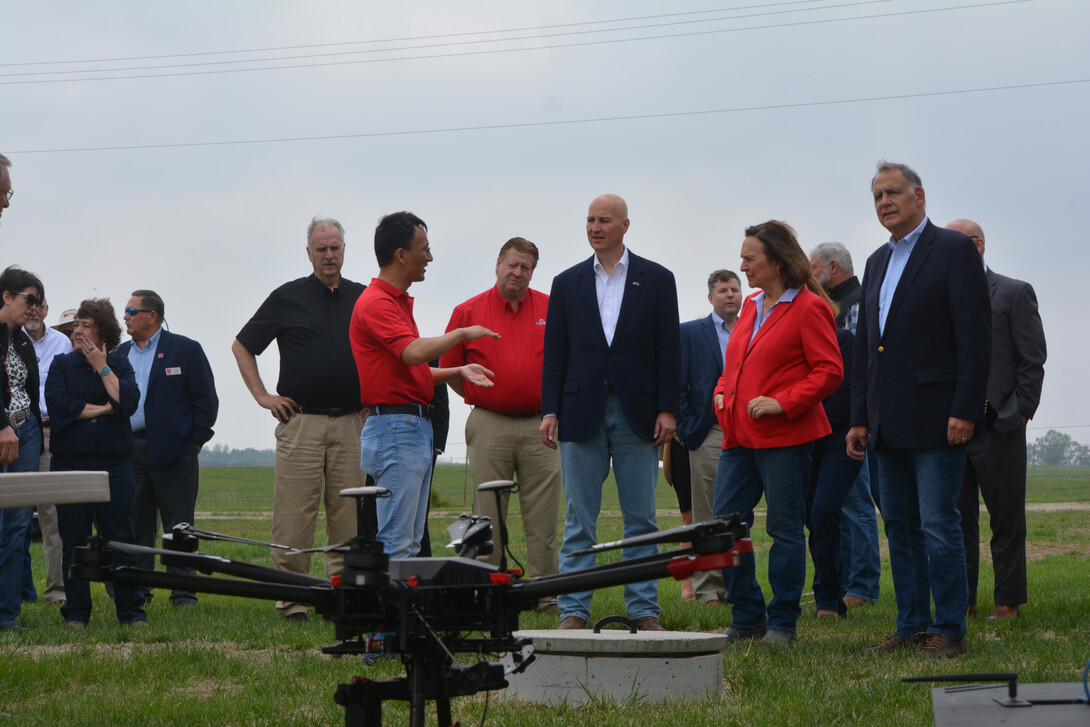
Lincoln, Neb. —It was a fast-paced visit to the University of Nebraska Eastern Nebraska Research, Extension and Education Center (ENREEC) for U.S. Senate Ag Committee Ranking Member John Boozman and Nebraska Senators Deb Fischer and Pete Ricketts. The visit highlighted the University of Nebraska's dedication to ongoing ag innovation that has led to leading-edge advances in research and education. There was much to showcase in a brief period of time.
The senators had the opportunity to learn about the University's advancements in agriculture and their benefits/impact for Nebraska farmers and ranchers through a meet and greet and roundtable session with University faculty, students and commodity boards. Discussion focused on innovations in beef production (including the Feedlot Innovation Center), Nebraska Future Ag Research and Management Systems (NFARMS), Long-term Agro-ecosystem Research (LTAR), collaboration with USDA Agricultural Research Service (ARS), agronomic developments, robotics and autonomous farming, plant phenotyping, carbon sequestration, on-farm research, remote sensing, water use efficiency, and nitrogen management.
Angela and Kerry Knuth farm just down the road from ENREEC and have been on the front lines when it comes to adopting new conservation practices, technology and precision ag. They noted that they utilize the guidance of consultants in the growth and evolution of their farm. They shared a few examples of how the University of Nebraska was instrumental as they diversified their operation when adding wheat to their crop rotation, cover crops, and implementing grazing. The Knuths are also actively involved with the University on-farm research studies and shared the value of partnering with University of Nebraska.
Some of the research “tools of the trade” were on hand including the Flex-Ro flexible robot, drones and a hail simulator. A trip to the one-acre plant phenotyping site included a close-up look at the Spidercam©, the state-of-the-art subsurface drip irrigation system, a high clearance interseeding system, and current planter technology. The senators also got a glimpse of the future site of the Klosterman Feedlot Innovation Center during a drive-by of the site that is currently under construction.
The senators voiced their support of the work the University is doing to advance agriculture and make Nebraska a leader in ag innovation. They capped off the ENREEC visit with comments on their priorities for this year’s Farm Bill.
Speaking about her visit to ENREEC, Senator Fischer commented, “We had a busy time hearing about all the fantastic research that is going on with our land grant university, especially, with regards to precision agriculture and how that research is going to translate to being available and working hand in glove with ag producers - so that we can become even better stewards, better conservationists, better producers of the food and the fuel and the fiber that Nebraska produces.”
Senator Bozeman stated, “Taking care of the air, taking care of the water and our land is really what this is all about. And it's going to be about technology. It's going to be about research. It's going to be about science in order to give us those capabilities. And it's not only good for the environment, it's good for our producers.” He added, “If you find out that you can put 60% of the fertilizer than you normally were applying with fertilizer costs 130% higher than they were a couple years ago, that's a big deal. That's good for the producer, it's good for the environment, it's good for everybody. So those are the kind of things that we are coming up with. We're going to take a lot of what we’ve heard today back and see how we can make a better Farm Bill.”
Senator Ricketts noted the importance of precision agriculture to get better yields with less inputs, whether that's reducing the amount of water or fertilizer used. He stated, “It all goes towards making sure that we can continue to have the great food security that we have here in this country. We've got the highest quality food, and also are able to take care of the environment at the same time. I was really excited to be able to see what we're doing to continue to make sure that we lead the world in agricultural innovation.” He also added, “One of the things that I always say is that our farmers and ranchers were the original conservationists because they want to pass on that family farm and ranch to the next generation. And what we saw was what the University of Nebraska is doing to help our farmers and ranchers continue to be the best conservationists in the world.”
The three senators agreed that agriculture is vital to national security, that it is critical to get the components right in the Farm Bill, and believe there is bipartisan support.







